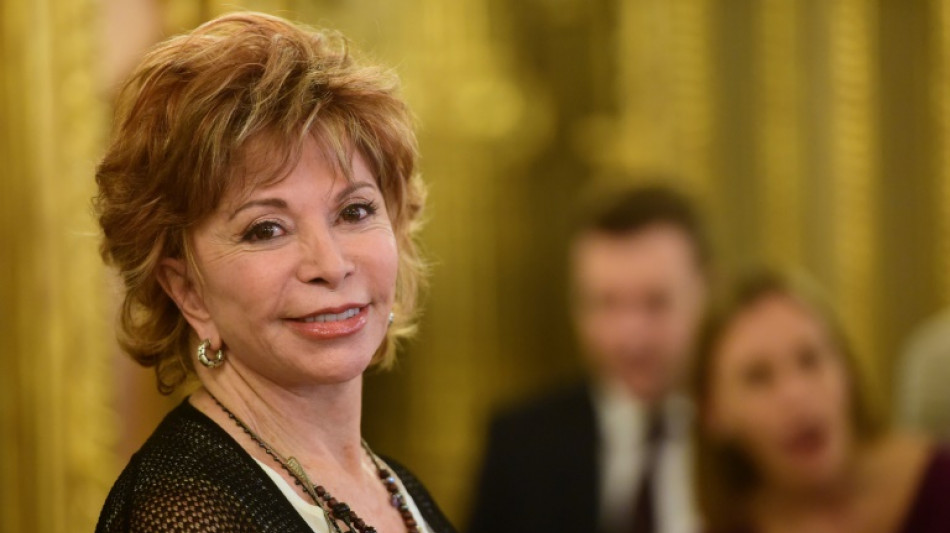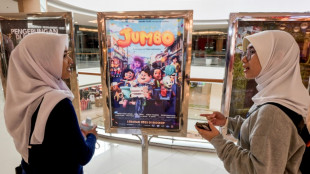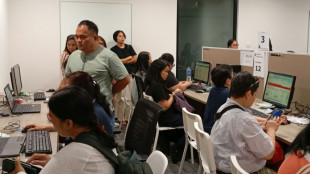
-
 Japan's Panasonic targets 10,000 job cuts worldwide
Japan's Panasonic targets 10,000 job cuts worldwide
-
Putin evokes WWII victory to rally Russia behind Ukraine offensive

-
 China exports beat forecasts ahead of US tariff talks
China exports beat forecasts ahead of US tariff talks
-
Leo XIV, the 'Latin Yankee', to celebrate first mass as pope

-
 Most stocks lifted by hopes for US-China talks after UK deal
Most stocks lifted by hopes for US-China talks after UK deal
-
IPL suspended indefinitely over India-Pakistan conflict: reports

-
 German lender Commerzbank's profits jump as it fends off UniCredit
German lender Commerzbank's profits jump as it fends off UniCredit
-
Rare bone-eroding disease ruining lives in Kenya's poorest county

-
 India says repulsed fresh Pakistan attacks as de-escalation efforts grow
India says repulsed fresh Pakistan attacks as de-escalation efforts grow
-
Zhao's historic snooker title sparks talk of China world domination

-
 'High expectations': EU looks to Merz for boost in tough times
'High expectations': EU looks to Merz for boost in tough times
-
Poisoned guests rarely invited before deadly mushroom lunch, Australia trial hears

-
 China sales to US slump even as exports beat forecasts
China sales to US slump even as exports beat forecasts
-
Indian cricket to make 'final decision' on IPL over Pakistan conflict

-
 Dethroned Bundesliga champions Leverkusen face uncertain future
Dethroned Bundesliga champions Leverkusen face uncertain future
-
China can play hardball at looming trade talks with US: analysts

-
 French monuments in trouble while PSG prepare for Champions League final
French monuments in trouble while PSG prepare for Champions League final
-
Newcastle face Chelsea in top five showdown, Alexander-Arnold in spotlight

-
 Flick's Barca must show 'hunger' in crunch Liga Clasico
Flick's Barca must show 'hunger' in crunch Liga Clasico
-
Clasico the last chance saloon for Ancelotti's Real Madrid

-
 Timberwolves overpower Warriors to level series
Timberwolves overpower Warriors to level series
-
Chinese fabric exporters anxious for US trade patch-up

-
 Putin gears up to host world leaders at lavish army parade
Putin gears up to host world leaders at lavish army parade
-
Nearing 100, Malaysian ex-PM Mahathir blasts 'old world' Trump

-
 Leo XIV, first US pope, to celebrate first mass as pontiff
Leo XIV, first US pope, to celebrate first mass as pontiff
-
Asian stocks lifted by hopes for US-China talks after UK deal

-
 Former head of crypto platform Celsius sentenced 12 years
Former head of crypto platform Celsius sentenced 12 years
-
Ex-model testifies in NY court that Weinstein assaulted her at 16

-
 Nestlé and OMP Showcase Approach to Future-Ready Supply Chain at Gartner Supply Chain Symposium/Xpo in Barcelona
Nestlé and OMP Showcase Approach to Future-Ready Supply Chain at Gartner Supply Chain Symposium/Xpo in Barcelona
-
Genflow Biosciences PLC Announces Share Subscription, Director's Dealing and Update

-
 Argo Blockchain PLC Announces 2024 Annual Results and Restoration of Listing
Argo Blockchain PLC Announces 2024 Annual Results and Restoration of Listing
-
'Great honor': world leaders welcome first US pope

-
 Pacquiao to un-retire and fight Barrios for welterweight title: report
Pacquiao to un-retire and fight Barrios for welterweight title: report
-
Trump unveils UK trade deal, first since tariff blitz

-
 Man Utd one step away from Europa League glory despite horror season
Man Utd one step away from Europa League glory despite horror season
-
Jeeno shines on greens to grab LPGA lead at Liberty National

-
 Mitchell fires PGA career-low 61 to grab Truist lead
Mitchell fires PGA career-low 61 to grab Truist lead
-
AI tool uses selfies to predict biological age and cancer survival

-
 Extremely online new pope unafraid to talk politics
Extremely online new pope unafraid to talk politics
-
Postecoglou hits back as Spurs reach Europa League final

-
 Chelsea ease into Conference League final against Betis
Chelsea ease into Conference League final against Betis
-
Pope Leo XIV: Soft-spoken American spent decades amid poor in Peru

-
 First US pope shared articles critical of Trump, Vance
First US pope shared articles critical of Trump, Vance
-
'Inexcusable' - NBA champs Boston in trouble after letting big leads slip

-
 US automakers blast Trump's UK trade deal
US automakers blast Trump's UK trade deal
-
Stocks mostly rise as US-UK unveil trade deal

-
 Trump presses Russia for unconditional 30-day Ukraine ceasefire
Trump presses Russia for unconditional 30-day Ukraine ceasefire
-
Anything but Europa League glory 'means nothing' for Man Utd: Amorim

-
 'Inexcuseable' - NBA champs Boston in trouble after letting big leads slip
'Inexcuseable' - NBA champs Boston in trouble after letting big leads slip
-
Pope Leo 'fell in love with Peru'and ceviche: Peru bishop


Isabel Allende: In Chile, the 'old fogeys' need to go
The "old fogeys" of Chilean politics must go, says Isabel Allende -- a stance that is true to form for the novelist, whose latest book "Violeta" is a sweeping epic depicting the transformation between past and present.
A new generation has taken power in Chile, and Allende, perhaps the most popular Spanish-language writer on the planet, is welcoming the dawning political era with open arms.
"In Chile, the old fogeys of the political and financial world have got to go home -- or to an asylum!" the Chilean author tells AFP during a recent video interview.
Gabriel Boric, a leftist who was elected Chile's youngest-ever president at age 35 last month, is already unsettling markets and turning traditional Latin American politics upside down by unveiling a young, women-majority cabinet.
Allende is cheering him on.
"It is a young generation that is taking power," she says.
She applauds his cabinet choices -- and also notes that this young government will have to implement a new Constitution in Chile.
"And that... is an opportunity for us to ask ourselves what sort of country we want," she says.
The changes make her hopeful, especially as they point towards equality for women and Indigenous people.
"And we must try to ensure that all this is part of the country without damaging the economic system, which has made progress in Chile but is very badly distributed, creating such terrible inequality that people are furious," she says.
- 'Broader vision' -
Change, the journey between the past and the present, has long been a theme of Allende's nearly 30 books, which have been translated into more than 40 languages and sold some 70 million copies.
In her new novel "Violeta," she tells the story of an independent woman who was born during one pandemic and dies during another.
Along the way, she witnesses the many transformations of a South American country that seems very much like Chile.
"The idea came to me after the death of my mother. She died shortly before the (Covid-19) pandemic, and she was born as the Spanish flu was coming to Chile, in 1920," Allende says.
The novel takes place during her mother's lifetime, which she describes as "a period in the 20th century of wars, depressions, dictatorships in Latin America, revolutions.
"I created a protagonist who resembles my mother in many ways, but who is not her and who had a much more interesting life."
The difference, she says, is that "Violeta can support herself, which gives her great freedom. My mother depended first on two husbands, and then on me."
In the novel, Violeta and her family leave the capital and move to the south of the country, where they live alongside people of more humble backgrounds.
It was important for Allende to show those class differences, she says, describing a "caste system" in Latin America "which in some places is quite impenetrable."
"And Chile is a country with many class prejudices, more than other countries, perhaps in part because there was little immigration in its early days.
"So Violeta, if she had remained in her social class, if she had lived the corresponding life, would never have gained a broader vision of the country, and of life."
- Stranger in a familiar land -
That kind of "broader vision" is reflected in Allende's own life also.
The author was born in Lima in 1942 -- but she has been abroad for many years, and now lives near San Francisco in the United States.
She describes a sensation familiar to anyone who has lived far from home for a long time, of being a stranger wherever she goes.
Whenever she returns to Chile, she says, "The first week I am happy, but then I realize that I am a foreigner there, too. It is my destiny.
"In the United States, I speak English with an accent. Anyone who sees me on the street knows that I am a Latina and that I am an immigrant.
"And in Chile, I have lived abroad for 40 years, and the country has changed a lot.
"In my head and in my heart is a country that no longer exists."
- Why stop? -
The journey between the past and the present is also reflected in her writing process, she says.
Some things don't change, such as the date she begins writing.
"I start all my books on January 8, so on the seventh I have to take nerve pills," Allende explains.
"The nerves have never left me, but I've learned that if I show up with discipline before the keyboard each day, something comes out."
She has also become "a little more relaxed," she says -- and she has learned that it is "no good" to have an outline.
"That paralyzes me and I lose all inspiration. I let the story change," she says.
"I enjoy writing so much. People tell me: 'You shouldn't have to write any more, you're getting too old for that.'
"But I love it. Why would I want to stop?"
A.Jones--AMWN



